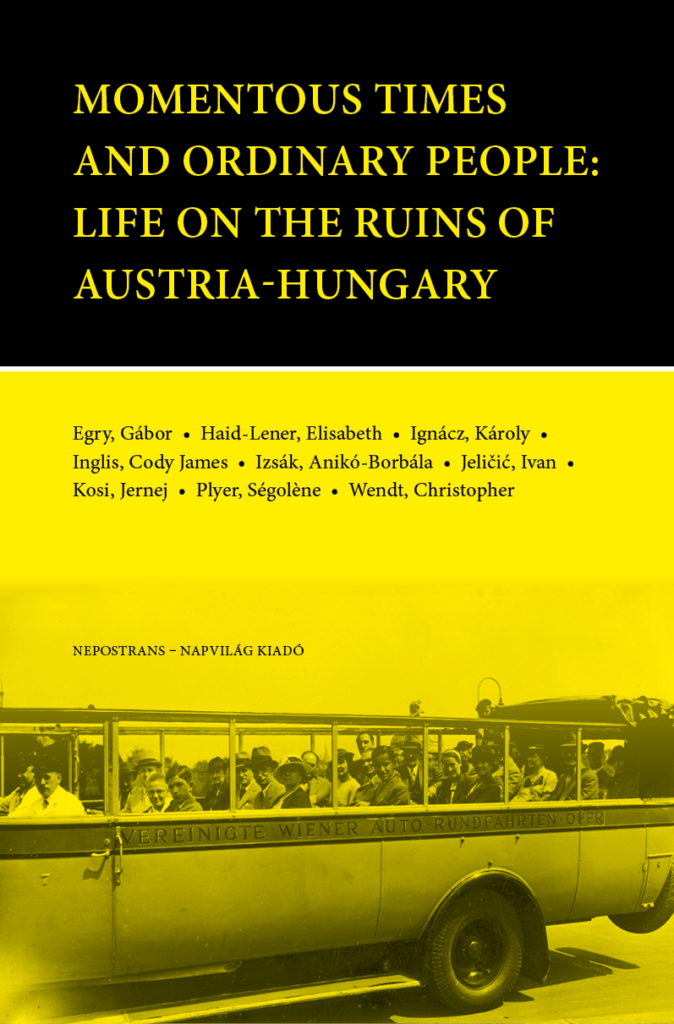Life on the Ruins of Austria-Hungary
Open Access
 This volume on the transition from the Habsburg Empire to its successor states offers a new picture of these events from a local perspective, one that highlights a generally less-known historical path foregrounding non-political processes and the possibilities in history rather than determined outcomes. We therefore invite you to take this book, which takes the form of mosaic, as a starting point to rethink the history of those lands that were formerly part of the Habsburg Empire.
This volume on the transition from the Habsburg Empire to its successor states offers a new picture of these events from a local perspective, one that highlights a generally less-known historical path foregrounding non-political processes and the possibilities in history rather than determined outcomes. We therefore invite you to take this book, which takes the form of mosaic, as a starting point to rethink the history of those lands that were formerly part of the Habsburg Empire.
What was new? What was inherited? Which elements of the Habsburg imperial legacy were demolished, and which were simply refurbished for new use?
The histories of Central, Eastern, and Southeastern Europe in the twentieth century are, in part, the histories of what people did with the legacies of the Habsburg Empire after it had ceased to function. More generally, political and social transitions are a fundamental part of the human experience in a shared European history, and this volume wants to bring forward this human element in that story.
From 2018 to 2023, a nine-person team conducted research in the framework of a European Research Council Consolidator Grant project entitled “Negotiating post-imperial transitions: from remobilization to nation-state consolidation. A comparative study of local and regional transitions in post-Habsburg East and Central Europe” (grant agreement no. 772264) — or NEPOSTRANS for short.
The book was published by Napvilág Publishers not only in English, but also in Hungarian, and in all the languages of the successor states (Czech, Croatian, Polish, German, Romanian, Serbian, Slovak, Slovenian).
CONTENTS
Introduction
Our friends – the Swiss, Belgian, French, Romanian, Czech, Yugoslav ones. Local and transnational economic networks and the fate of Austro-Hungarian business elites – Economic transition
“Dangerous Riots” in the “hot summer” of 1917 – rising labour movement and urban–rural conflict during and after the First World War – Urban conflict
Against the “Law of Nature”: Daylight Savings Time and the Local Origins of Regionalism in Austrian Tyrol – Regionalism
“Monarchy or Republic, Nation-State or Micro-State?Central and Southeastern European Visions of Statehood in the First Moments of Post-Imperial Transition, 1918–20”-State form
Leavers and Remainers: The Self-Fashioning of a Hungarian Administrative Official Leaving Greater Romania – Migration and citizenship
“The house, in which we lived, has been burned down“. The Old and the New, the Habsburg Past as a Negative or a Positive Point of Reference – Discourses
A nationalizing fa.ades? Reflections on education in local post-imperial settings – Schools and cultural politics
The private bases of the growing state intervention in the economy. Bohemian textile firms and the transformation of the flax market, 1915-1925 – Economic intervention
Conclusion: A (post)imperial context without an Empire?
Authors:
- Egry, Gábor
- Haid-Lener, Elisabeth
- Ignácz, Károly
- Inglis, Cody James
- Izsák, Anikó-Borbála
- Jeličić, Ivan
- Kosi, Jernej
- Plyer, Ségolène
- Wendt, Christopher





